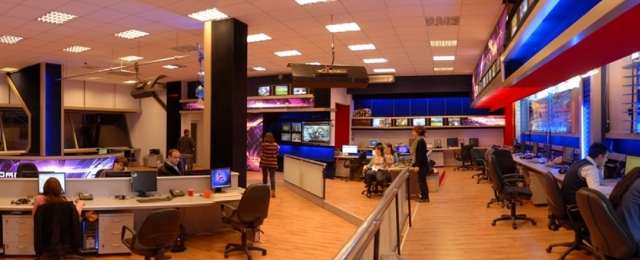Rustavi 2: Icon of Georgian Democracy?
Last week, Nika Gvaramia, the General Director of Rustavi 2, promised that the Georgian Government would be shut down before his company was.
“The government delivered a death sentence when it closed Rustavi 2 TV. Now we must attract grants. We are working without pay and we have to increase our income. We promise the government that they will be closed before we are,” Gvaramia stated.
The TV company has said that if they can raise 6 million Lari from investors, then the company could survive financially.
“There will be protests within the framework of freedom of expression. We are different from the government. Their representatives and supporters rush into judges homes and humiliate their children. We will not allow anybody to do that. We will act legally,” Gvaramia declared yesterday.
100% percent of Rustavi 2’s properties were sequestrated at the end of August at the request of a former stakeholder in the company, businessman Kibar Khalvashi. Last week, the court deprived one of the shareholders of Rustavi 2 “TV Company Sakartvelo” from selling their shares to benefit Rustavi 2.
The TV company itself says the case is rife with political motivations and accuses the government of fighting media freedom in the country. There are direct accusations against Bidzina Ivanishvili, the former Georgian PM, who is believed to be ruling the country from the shadows.
Rustavi 2, Georgia’s largest TV Company and the country’s leading media organization, faced an initial attack when 100% of its shares were sequestered on behalf of Georgian businessman Kibar Khalvashi- who filed a lawsuit to attempt to regain his share of the company on August 7 this year. The dispute concerning the broadcaster has attracted nationwide concern.
Along with Khalvashi, two founders of Rustavi 2, Jarji Akimidze and Davit Dvali, released a statement subsequent to the freezing of assets, citing that the broadcaster has been strictly controlled by the United National Movement, the main opposition party in Georgia. According to the two, there are no alternatives for the legislative process, which “serves to establish fairness in a democratic society.”
In response, Nika Gvaramia cited that both Akimidze and Dvali represented voices of the government. He went on to accuse the entire government, and the Georgian Dream coalition in general, of attacking free media and freedom of speech.
The sequestration was followed by a social media campaign in support of the television station, which has endured a number of attacks from different governments throughout its more than two decades of operation. Thousands of supporters have appeared on social networks - including Georgian expats – with messages of support for the values they believe Rustavi 2 is based on.
The story of Rustavi 2 is widely compared to the case of Imedi TV back in 2007, which played a considerable part in Georgia being refused MAP at the Bucharest Summit. Notably, Georgia is currently seeking its considerable advancement at the forthcoming NATO Warsaw Summit in July 2016. However, there are negligible questions as to whether the attack on Rustavi 2 will result in refusing Georgia any tangible progress regarding the alliance membership.
Importantly, the Rustavi 2 case has attracted international attention. The OSCE Representative on Freedom of the Media, Dunja Mijatovi, in August assessed that excessive court measures against the Georgian television channel Rustavi 2, based on an ownership dispute, may pose a threat to free media. European MPs, including the US side and other Georgia’s international partners, have expressed their fears concerning the case against the TV company, claiming the decision is disproportionate, excessive and might constitute a threat to media pluralism in Georgia.
At the same time, Georgian civil society institutions such as Media Development Foundation (MDF), Georgia’s Reforms Association (GRASS) and Tolerance and Diversity Institution (TDI) have shown support for Rustavi 2.
Analysis by Georgia Today’s Zviad Adzinbaia:
The Georgian government, while denying its involvement in the process of the attack against the main broadcaster in Georgia, have openly expressed some radical positions against the media institution. Even the statements by the then-PM Bidzina Ivanishvili and his team members following the 2012 elections unceasingly articulated their negative positions against Rustavi 2, which could have been the very sign of a desire to attempt subordination of the Georgian media.
At this crucial moment for Georgian democracy, the case of Rustavi 2 is believed to have a multiplier effect on the general media environment in the country. Additionally, to ensure the conducting of free and fair parliamentary elections in October 2016, Rustavi 2 is considered the main institution in spite of its lack of sympathies towards the government. Furthermore, Rustavi 2 could be regarded as the icon of Georgian democracy and any threat to the company could equal a threat to the rest of the country.
Zviad Adzinbaia












